The current health situation has increased the focus on solutions enhancing the immune system in a natural way. Grape and olive extracts are rich in phenolic compounds, which have shown to have various positive actions on the immune system
The main role of the immune system is to detect and distinguish foreign, dangerous compounds or cells from healthy ones, and work at their removal from the organism. But it is a balance and the immune system can get overactive and in this way turn against the host itself.
Grape and grape seed extracts contain several phenolic compounds including proanthocyanidins, anthocyanins and resveratrol, while olive extracts contain hydroxytyrosol and tyrosol. All of these are antioxidants, which are able to help prevent and protect against oxidative stress, tissue damage and inflammation.
Studies have shown that the phenolic compounds present in e.g. grape and olive extracts may have positive effects on the immune system including on skin, immune cell activity, gut microbiota and inflammation.
Actions on skin
Phenolic compounds and metabolites can help preserve the integrity of the skin. The skin is exposed to environmental stresses such as UV light, reactive oxygen species (ROS) and bacterial liposaccharides (LPS), which could cause tissue damage. As shown in figure 1 several actions of grape and olive compounds and metabolites help protecting the skin.
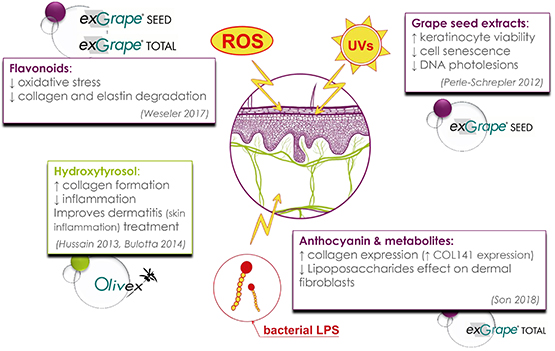
Action on immune cell activity
Grape extract and olive extract compounds show interesting effects on different immune cells. There is both an improvement of immune cells’ function and a decrease of their accumulation in the tissues (cf. figure 2).
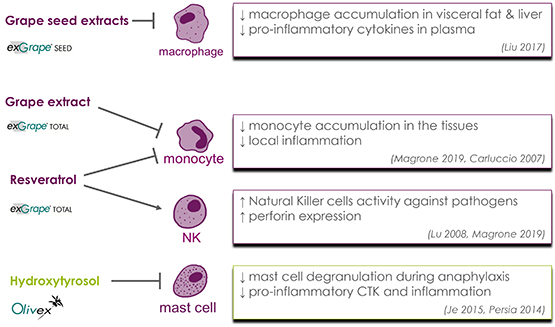
Action on gut microbiota
Several studies show the positive effects of grape or olive extracts on the gut microbiota (cf. figure 3). They contribute to promoting positive microflora and to reducing negative microflora and in this way help preventing dysbiosis which is involved in numerous disorders and leads to weakening of the immune system.
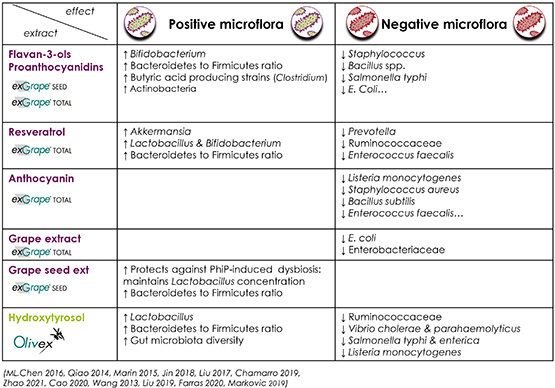
When the inflammation gets carried away
Inflammation is one of the main mechanisms through which the body protects itself from pathogens and toxins but it is important that it is only a short-term effect. Many human diseases are driven by an uncontrolled chronic inflammation, which is a vicious circle leading to permanent tissue damage and dysfunction. Most chronic inflammatory diseases start by a similar process: immune cells release pro-inflammatory cytokines which leads to the activation of endothelial cells on the inflammation site, which then produce more inflammatory mediators and amplify the inflammation process. The adaptive immune system also participates in the process once the immature T-cells have been activated by macrophages and other antigen-presenting cells. For example, they can differentiate into T helper cells, which can then produce cytokines. So, yes, the immune system must be strong, but it is important to regulate the inflammation to avoid feeding a chronic inflammation leading to a weakening of the immune system in the long term.
Numerous studies (cf. figure 4) have shown a positive effect of grape and grape seed extracts on chronic inflammation through lowering the expression and activity of pro-inflammatory factors such as TNF-α, IFN-γ, IL-1β, IL-6 and other cytokines as well as inflammation-inducing NF-κB transcription factor and MAPKs activation.
Hydroxytyrosol from olive extract has also been demonstrated to have an important effect on inflammation, as it decreases the expression and activity of many different inflammatory markers (such as IL-1β, COX2, IL-6, TNF-α) and increases the expression of cytokines that improve the anti-inflammatory defense (IL-10).
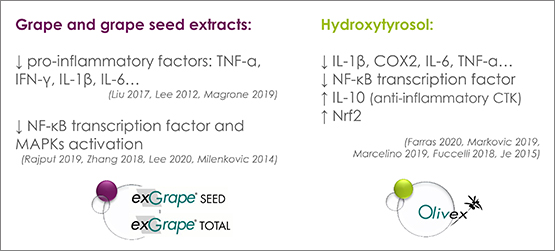
exGrape®SEED – exGrape®TOTAL – Olivex®
The Grap’Sud group range of phenolic compounds is mainly produced from French grapes and olives. With the advantage of vast areas for collection of raw materials, the group offers a range of tracked and high quality extracts.
exGrape®TOTAL, red grape polyphenols titrated with anthocyanins, exGrape®SEED grape seed extracts rich in procyanidins, and Olivex® olive extracts with standardised levels of hydroxytyrosol and tyrosol are all supported by scientific studies.
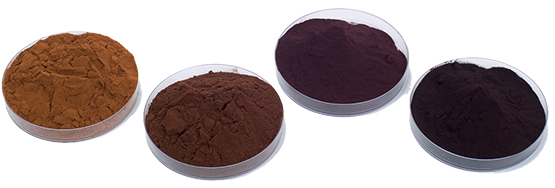
References
1. Bulotta et al. (2014), Beneficial effects of the olive oil phenolic components oleuropein and hydroxytyrosol: focus on protection against cardiovascular and metabolic disease, Journal of Translational Medicine, 12(219).
2. Cao et al. (2020), Change of Serum Metabolome and Cecal Microflora in Broiler Chickens Supplemented With Grape Seed Extracts, Frontiers in Immunology, 11(610934)
3. Carluccio et al. (2007), Homocysteine induces VCAM-A gene expression through NF-κB and NAD(P)H oxidase activation: protective role of Mediterranean diet polyphenolic antioxidants, American Journal of Physiology-Heart and Circulatory Physiology, 293
4. Chamorro et al. (2019), Impact of a sustained consumption of grape extract on digestion, gut microbial metabolism and intestinal barrier in broiler chickens, Food Function, 10, 1444.
5. M-L.Chen et al. (2016), Resveratrol Attenuates Trimethylamine-N-Oxide (TMAO)-Induced Atherosclerosis by Regulating TMAO Synthesis and Bile Acid Metabolism via Remodeling of the Gut Microbiota, American Society for Microbiology, 7(2)
6. Farras et al. (2020), Modulation of the Gut Microbiota by Olive Oil Phenolic Compounds: Implications for Lipid Metabolism, Immune System, and Obesity, Nutrients, 12(2200).
7. Fuccelli et al. (2018), Hydroxytyrosol Exerts Anti-Inflammatory and Anti-Oxidant Activities in a Mouse of Systemic Inflammation, Molecules.
8.Hussain et al. (2013), Self-assembled polymeric nanoparticles for percutaneous co-delivery of hydrocortisone/hydroxytyrosol: An ex vivo and in vivo study using an NC/Nga mouse model, International Journal of Pharmaceutics, 444, 109-119.
9. Je et al. (2015), Tyrosol Suppresses Allergic Inflammation by Inhibiting the Activation of Phosphoinositide 3-Kinase in Mast Cells, Plos One, 10(6)
10. Jin et al. (2018), Proanthocyanidin-Rich Grape Seed Extract Modulates Intestinal Microbiota in Ovariectomized Mice: Modulation of intestinal microbiota, Journal of Food Science, 83(4), 1149-1152.
11. Lee et al. (2012), Grape Seed Proanthocyanidin Extract Attenuates Allergic Inflammation in Murine Models of Asthma, Journal of Clinical Immunology, 32, 1292-1304.
12. Liu et al. (2017), Grape seed proanthocyanidin extract ameliorates inflammation and adiposity by modulating gut microbiota in high-fat diet mice, Molecular and Nutritional Food Research.
13. Liu et al. (2019), Hydroxytyrosol Improves Obesity and Insulin Resistance by Modulating Gut Microbiota in High-Fat Diet-Induced Obese Mice, Frontiers in Microbiology, 1(390).
14. Lu et al. (2008), Resveratrol ameliorates Serratia marcescens-induced acute pneumonia in rats, Journal of Leukocyte Biology, 83, 1028-1037.
15. Magrone et al. (2019), Recent Advances on the Anti-Inflammatory and Antioxidant Properties of Red Grape Polyphenols: In Vitro and In Vivo studies, Antioxidants, 9(35).
16. Marcelino et al. (2019), Effects of Olive Oil and Its Minor Components on Cardiovascular Diseases, Inflammation, and Gut Microbiota, Nutrients, 11(1826).
17. Marin et al. (2015), Bioavailability of Dietary Polyphenols and Gut Microbiota Metabolism: Antimicrobial Properties, BioMed Research International.
18. Markovic et al. (2019), Hydroxytyrosol, Tyrosol and Derivatives and Their Potential Effects on Human Health, Molecules, 24(2001).
19. Milenkovic et al. (2014), Dietary Flavonols Modulate the Transcription of Genes Associated with Cardiovascular Pathology without Changes in Their DNA Methylation State, Plos One, 9(4).
20. Perde-Schrepler et al. (2012), Grape seed extracts as photochemopreventive agent against UVB-induced skin cancer, Journal of Photochemistry and Photobiology, 118(2013), 16-21.
21. Persia et al. (2014), Hydroxytyrosol and oleuropein of olive oil inhibit mast cell degranulation induced by immune and non-immune pathways, Phytomedicine, 21, 1400-1405
22. Qiao et al. (2014), Effects of resveratrol on gut microbiota and fat storage in a mouse model with high-fat-induced obesity, Food and Function, 5(1241), 1241-1249
23. Rajput et al. (2019), Grape Seed Proanthocyanidin Extract Alleviates Aflatoxin B1 Induced Immunotoxicity and Oxidative Stress via Modulation of NF-κB and Nrf2 Signaling Pathways in Broilers, Toxins, 11(23).
24. Son et al. (2018), Protective effect of protocatechuic acid against inflammatory stress induced in human dermal fibroblasts, Biomedical Dermathology, 2(9).
25. Wang et al. (2013), Dietary grape seed extract ameliorates symptoms of inflammatory bowel disease in IL10-deficient mice, Molecular and Nutritional Food Research, 57, 2253-2257
26. Weseler et al. (2017), Masquelier’s grape seed extract: from basic flavonoid research to a well-characterized food supplement with health benefits, Nutrition Journal, 16(5).
27. Zhang et al. (2018), 3-(4-Hydroxyphenyl)propionic acid, a major microbial metabolite of procyanidin A2, shows similar suppression of macrophage foam cell formation as its parent molecule, RSC Advances, 8(6242).
28. Zhao et al. (2021), Grape seed extract ameliorates PhiP-induced colonic injury by modulating gut microbiota, lipid metabolism, and NF-κB signaling pathway in rats, Journal of Functional Food, 78.


